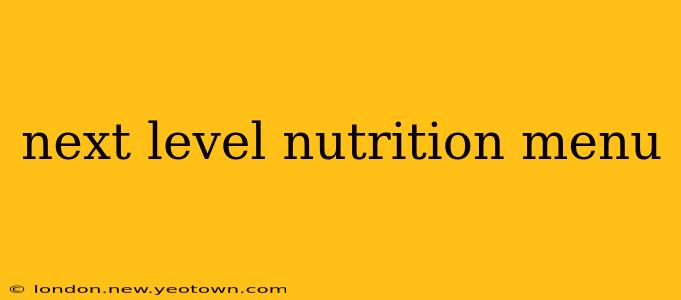Let's be honest, "nutrition" often feels like a chore. Diets feel restrictive, and the endless stream of conflicting advice can be overwhelming. But what if I told you that reaching your nutritional goals could be exciting, delicious, and even fun? This isn't about deprivation; it's about fueling your body for optimal performance – whatever your "peak" looks like. This menu is a blueprint, a springboard to help you design your own "next level" nutrition plan. It focuses on whole foods, mindful eating, and a flexible approach that adapts to your lifestyle and goals.
Understanding Your "Next Level"
Before we dive into specific dishes, let's define what "next level nutrition" means to you. Are you an athlete aiming for peak physical condition? Are you looking to boost energy levels and concentration? Are you striving for weight management or improved overall health? Your individual goals will shape your menu choices. This menu offers a diverse range of options to help you build your personalized plan.
What are the different dietary approaches to consider?
This is a crucial question, and one that many people struggle with. There's no one-size-fits-all answer. Popular approaches include:
- Paleo: Emphasizes whole, unprocessed foods like fruits, vegetables, lean meats, and nuts, excluding grains, legumes, and dairy. This approach can be effective for some, but it's essential to ensure you're getting enough micronutrients.
- Ketogenic: Focuses on high-fat, moderate-protein, and very-low-carbohydrate intake, forcing the body into a metabolic state called ketosis. It can be effective for weight loss but requires careful planning and monitoring.
- Mediterranean: Abundant in fruits, vegetables, olive oil, whole grains, legumes, nuts, and fish. This diet emphasizes plant-based foods and is associated with numerous health benefits.
- Vegetarian/Vegan: Excludes all animal products (vegan) or just meat (vegetarian). These diets can be highly nutritious but require careful planning to ensure adequate protein and essential nutrient intake.
Ultimately, the "best" dietary approach is the one that's sustainable and enjoyable for you. Experiment, listen to your body, and don't be afraid to adapt your plan along the way.
How do I calculate my macronutrient needs?
Determining your ideal macronutrient ratios (carbohydrates, protein, and fat) is a personalized process. Online calculators can provide estimates based on your age, activity level, and goals. However, consulting a registered dietitian or nutritionist is highly recommended for personalized guidance. They can help you create a plan that aligns with your specific needs and preferences, ensuring you're meeting all your nutritional requirements.
What are some examples of nutrient-dense meals?
This is where the fun begins! The following examples showcase the versatility of a "next level" nutrition approach. They are not restrictive but illustrative of the principles involved:
Breakfast:
- Overnight Oats with Berries and Nuts: A simple, high-fiber option packed with antioxidants and healthy fats.
- Greek Yogurt with Fruit and Chia Seeds: A protein-rich start to the day, providing sustained energy and gut health benefits.
- Scrambled Eggs with Spinach and Avocado: A delicious and nutrient-dense combination providing protein, vitamins, and healthy fats.
Lunch:
- Large Salad with Grilled Chicken or Fish: A customizable option incorporating lean protein, plenty of vegetables, and healthy fats.
- Lentil Soup with Whole-Grain Bread: A hearty and fiber-rich meal, providing sustained energy and essential nutrients.
- Leftovers from Dinner: A convenient and sustainable way to ensure you're eating nutritious meals throughout the day.
Dinner:
- Baked Salmon with Roasted Vegetables: A lean protein source rich in omega-3 fatty acids, paired with nutrient-rich vegetables.
- Chicken Stir-fry with Brown Rice: A customizable and flavorful option incorporating lean protein, vegetables, and whole grains.
- Vegetarian Chili with Quinoa: A hearty and protein-rich vegetarian option, providing sustained energy and fiber.
Remember, this is just a starting point. The key is to experiment, find what you enjoy, and create a sustainable plan that supports your overall well-being. Your "next level" nutrition journey is a personalized adventure; embrace the exploration and enjoy the process!

